Access here Comprehensive Data on Electoral Bonds (as of February 2024)
Electoral Trusts were introduced in 2013 to provide another way for donations to political parties. While the contributions to electoral trusts increased till 2016-17, they have gone down ever since. In 2018-19, donations through anonymous electoral bonds are 10 times the contributions received by electoral trusts.
The Electoral Trust Scheme was introduced in January 2013, which created a provision for political parties to receive funding through these Electoral Trusts. Since the inception, the electoral trusts formed a major part of the funding received by the political parties.
An Electoral trust is deemed as a company registered under Companies Act, 1956 and can receive donations from an individual, company or association. These funds are required to be disbursed among the political parties who meet the criteria set by the respective trusts. While, one gets to know the names of the contributor as well as the beneficiaries, Electoral trusts do create an intermediate layer that makes it difficult to identify correlation between the donor & the beneficiary.
Meanwhile, Electoral Bonds were introduced in January 2018 and have become a key part of funding received by political parties with around ₹ 6 thousand crores worth of electoral bonds sold since their introduction.
In this story, we analyse the trends in donations received by electoral trusts and their disbursal to political parties, especially in the context of the introduction of electoral bonds as a source of political party funding.
Only 5 trusts have declared the receipt of contributions in 2018-19
There are a total of 26 approved electoral trusts which are registered with Central Board of Direct Taxes (CBDT) as of 19 February 2020.
As per the guidelines laid out in Electoral Trusts Scheme 2013, the approval provided to a registered Electoral trust is valid for the same assessment year relevant to the financial year in which the application was made. It can be extended to a period of three assessment years. Hence, it is required for the electoral trusts to apply for registration once the approval period is completed.

As per Association for Democratic Reform’s ’Analysis of Contribution Reports of Electoral Trusts – FY 2018-19’, registration of 4 of these 21 trusts were not renewed as on 02 December 2019. A total of 15 trusts have submitted their contribution reports to Election Commission of India (ECI) for 2018-19, while 5 trusts have declared the receipts of contributions from individuals & corporate houses.
The five Electoral trusts which have received contributions in 2018-19 include – Prudent, AB General, New Democratic, Samaj and Janhit.
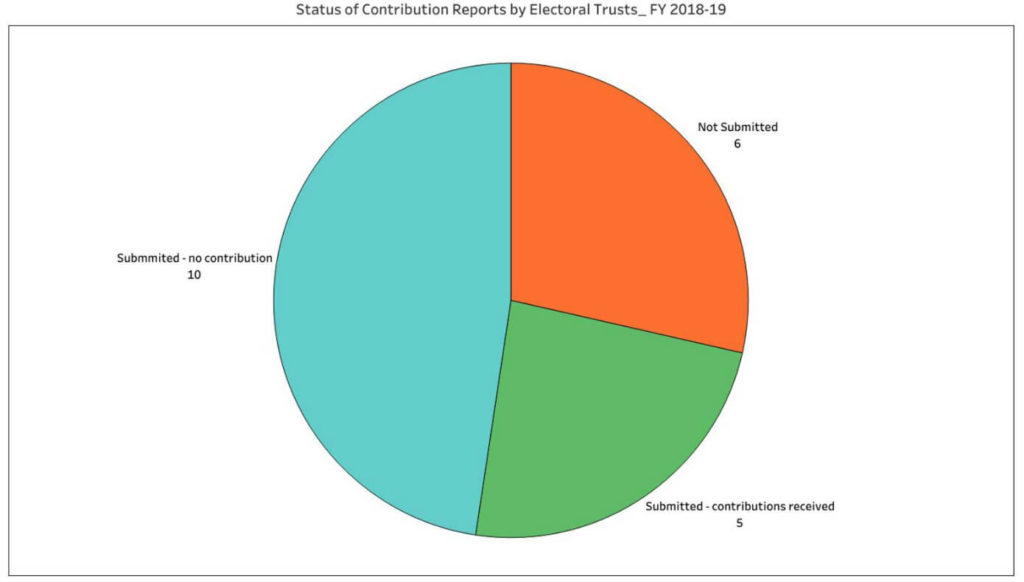
In 2018-19, around 70% of the total contributions to Electoral trusts was to a single trust
The five Electoral trusts have received a total of ₹ 252 crores of which they have managed to disburse ₹ 251.55 crores i.e. around 99.85% of the total contributions received in 2018-19. Electoral trusts are required to disburse minimum of 95% of the total income received in the current financial year, to the political parties. A major portion of the total was received by Prudent Electoral Trust with ₹ 182.33 crores followed by A.B. General which received ₹ 57.25 crores. This is in line with previous year where in Prudent ET (Satya) received ₹ 169 crores out of the total 194 crores received by all the electoral trusts in 2017-18.
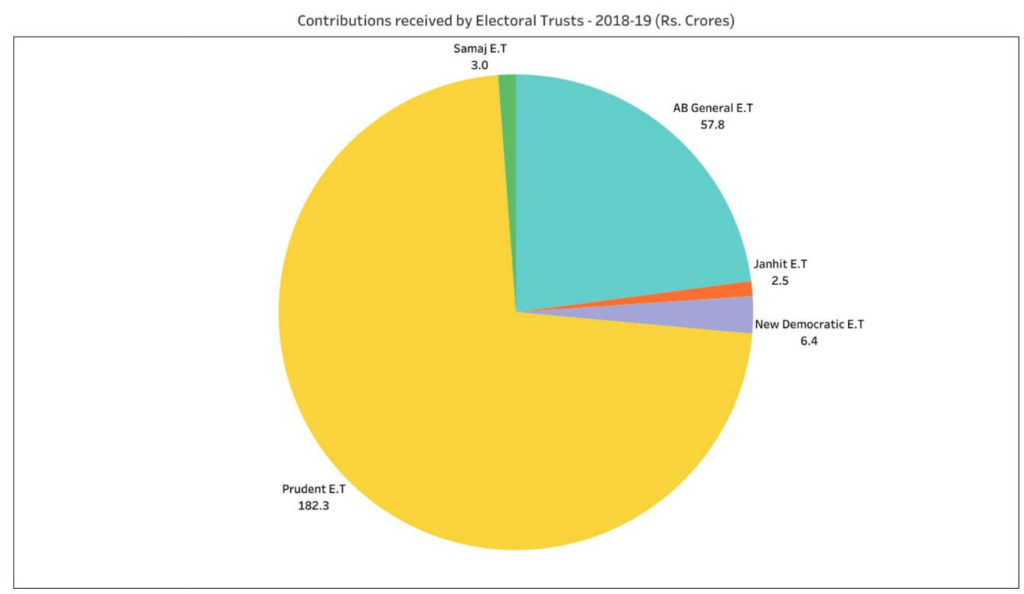
Inconsistent trend in the volume of contribution received by Electoral trusts
The highest amount of contributions received by Electoral trusts during the 6-year period of their existence was in 2016-17, where in a total of ₹ 325.45 crores were received, and ₹ 325.27 crores was disbursed to political parties. During all these years, the disbursal percentage has been higher than 99.8%, more than the minimum required 95%.
In 2013-14, when Electoral Trusts Scheme was introduced, there was only one electoral trust- Satya Electoral Trust which received the contribution which amounted to ₹ 85.4 crores. In the next year, the amount more than doubled to ₹ 177.55 crores. received by 6 Electoral trusts albeit Satya E.T being the highest receiver. There was a sharp fall for 2015-16 with only two electoral trusts declaring to have received contributions amounting to a total of ₹ 49.5 crores.
This was followed by the high in 2016-17 as highlighted earlier. In 2016-17, 6 Electoral Trusts have stated to have received contributions in the reports submitted. The highest contribution was received by Prudent Electoral Trust to the tune of 283.7 crores. This trust was earlier known as Satya Electoral Trust; therefore, it continues to be the trust receiving the major share of contributions.
Electoral Trusts received lesser funding in both 2017-18 and 2018-19. In 2017-18, 5 electoral trusts have received contributions amounting to ₹ 193.78 crores. This has increased in 2018-19, with ₹ 252 crores received by 5 electoral trusts. 2018-19 also happens to be the year with second highest total amount received by electoral trusts.
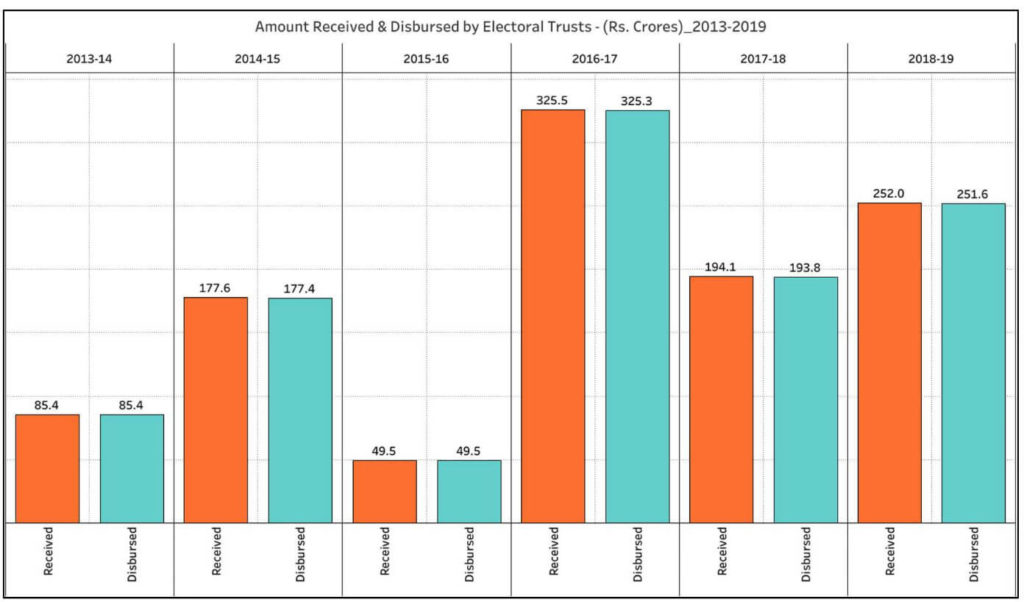
Corporates are the major donors to Electoral Trusts
As per the contribution reports submitted by Electoral Trusts in 2018-19, only two individual donors are reported to have made contributions with the rest of the contributions from corporates or associations. The contributions made by these two individuals was ₹ 50 lakhs & ₹ 11 lakhs, and both of the contributions made to Prudent Electoral Trusts.
- Out of the total ₹ 252 crores received by these trusts in 2018-19, ₹ 161.42 crores i.e. 64% is donated by top 10 contributors, all of who happen to be corporates.
- The highest contribution was made by GMR Hyderabad International Airport with ₹ 25 Crores contributed to Prudent Electoral Trust.
- Two more companies from GMR group i.e. GMR Airport Developers & GMR Hyderabad Air Cargo & Logistics Pvt Ltd are among the top five donors with ₹ 19 crores and ₹15 crores respectively.
- Ultratech Cement is the second highest contributor with ₹23 crores followed by Bharti Airtel with ₹ 21.17 crores.
For the year 2017-18, 71% of the 194 crores received by electoral trusts was contributed by top 10 donors.
- Total amount contributed by top 10 donors in 2017-18 is ₹ 139 crores, all of who happen to be corporates.
- Bharti Airtel contributed the highest with ₹ 25 crores followed by DLF who also contributed ₹ 25 crores.
- UPL ltd, DLF Home Developers Ltd & Cadila Healthcare Ltd contributed ₹ 22 crores, ₹12 crores and ₹10 crores respectively.
- As per the contribution reports, only two individuals made contributions, both for Janshakti Electoral Trust. The contributions were ₹ 10 Lakhs & ₹ 11 thousand respectively.
2016-17, which is the year with the highest contribution to Electoral trusts has 58% of the total contribution received from the top 10 donors.
- Around ₹190 crores out of ₹ 325 crores were from top 10 donors.
- DLF Limited is the highest donor with ₹ 28 crores.
- UP Ltd & JSW Energy limited have contributed ₹ 25 crores each to electoral trusts.
- While there are only two individual contributors, the amount contributed is significant. Mr. Suresh. A. Kotak made a contribution of ₹18.5 crores to Janta Nirvachak Electoral Trust. He also happens to be the fifth highest contributor in 2016-17.
BJP is the major beneficiary of the funds disbursed by electoral trusts
Over the six-year period between 2013-14 and 2018-19, a total of ₹758.5 crores were disbursed by various Electoral Trusts to BJP. The second highest beneficiary is Indian National Congress which received less than 1/5th of the funds received by BJP with ₹ 140.7 crores. A major chunk of this is during 2018-19 when Congress Party received ₹ 43 crores. Among the other national parties, NCP received ₹14.2 crores over the years.
Few of the regional parties were disbursed more funds by Electoral trusts especially during election years. Biju Janata Dal received the highest funds from electoral trusts among the regional parties with ₹ 48.5 crores, of which ₹ 27 crores were received from A.B General Electoral Trust in 2018-19.
The three major regional parties in the two Telugu speaking states of A.P & Telangana have received considerable amounts from Electoral trusts in 2018-19 when assembly elections were held. YSRCP, TDP and TRS received ₹ 27 crores, ₹ 25 crores and ₹ 16.2 crores respectively from these electoral trusts.
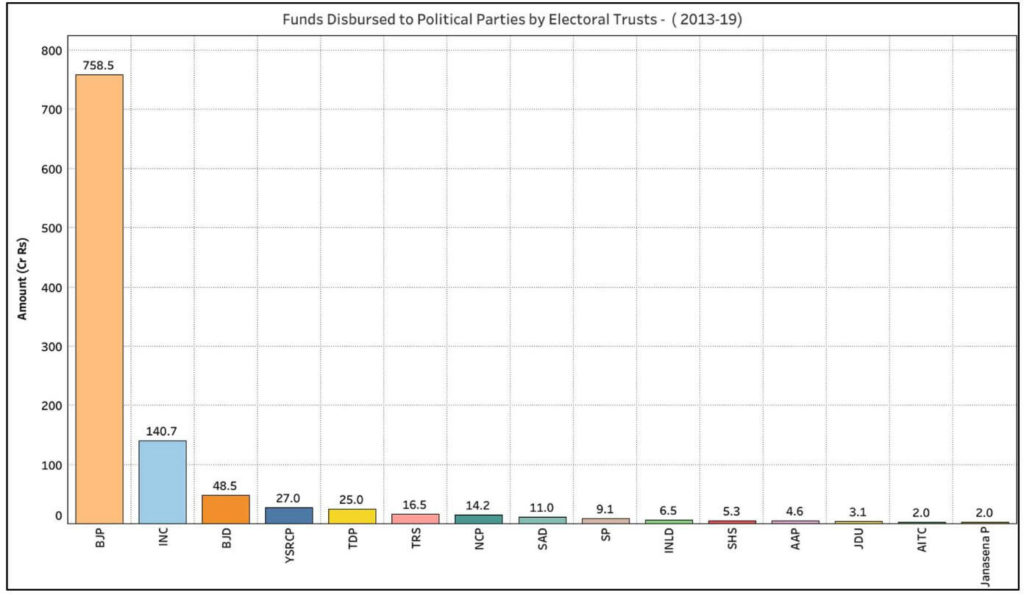
Most of the electoral trusts have not received any contributions
As highlighted earlier in the story, 10 out of the 21 electoral trusts in 2018-19 have stated that they have not received any contribution. This is continuation of a trend since the introduction of electoral trusts in 2013-14.
Every year, many of the Electoral Trusts have reported as not receiving any funds. While the number of trusts who have not submitted the contribution reports is higher than earlier, even among the ones that have submitted the contribution reports, many of them have not received any contributions.
As observed by ADR in their report, 6 Electoral trusts have not received any donations since the time of registration.

Only Prudent Electoral Trust (earlier known as Satya Electoral Trust) has not only submitted the contribution reports every year but also has received contributions every year.
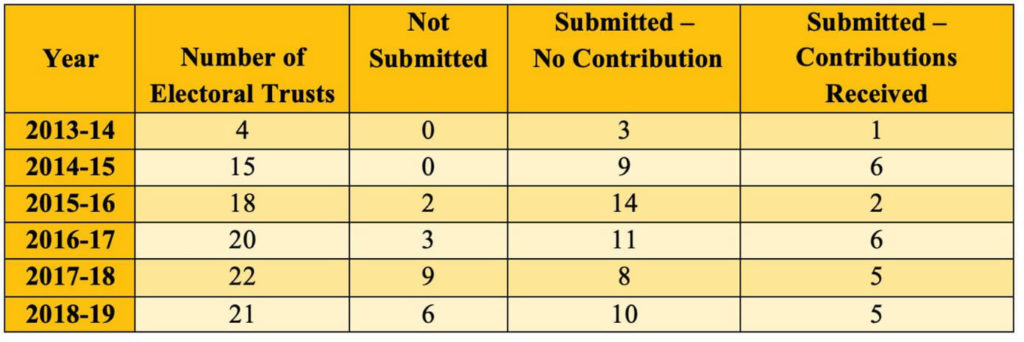
Electoral Trusts receive significantly lesser contributions compared to Electoral Bonds
The highest amount received by Electoral Trusts in a financial year was ₹ 325.5 crores in the year 2016-17. This was prior to the introduction of Electoral Bond scheme in January 2018. For 2017-18, ₹220 crores worth of Electoral Bonds was purchased which is higher than the amount received by Electoral Trusts in that financial year i.e. ₹ 194.1 crores.
Although the Electoral Trusts received a higher amount in 2018-19 with ₹ 252 crores, the total amount of Electoral Bonds purchased in that financial year is ₹ 2,550.78 crores i.e. around 10 times the contribution received by the electoral trusts.
The contributions received by electoral trusts for 2019-20 can only be ascertained after submission of contribution reports in later part of the 2020. Meanwhile, a sum of ₹ 3,355.93 crores worth of Electoral Bonds have already been purchased in 2019-20 by end of 12th phase i.e. 01 Oct – 10 Oct’2019. There was another batch of Electoral Bonds sale in January 2020, whose details have been sought by Factly under RTI. It is possible that the contributions to electoral trusts might further reduce in 2019-20 and they may be only a fraction of the amount through electoral bonds.
There is a dire need for greater transparency
A major portion of the electoral trusts reporting as not receiving any contributions does raise questions about the very existence of such electoral trusts, as the main purpose is to receive contributions from various sources and disburse them among the political parties. Further-more few of the electoral trusts not even submitting the contribution reports also increases the ambiguity surrounding them.
As in the case of electoral bonds, citizens will get to know about the beneficiaries of disbursement by electoral trusts only after about 6 months from the end of a financial year, which defeats the entire purpose of electoral funding transparency.
It is early to ascertain the impact of introduction of electoral bonds on electoral trusts since it has been only two years since their introduction. However, it does appear that corporates and other donors are favouring electoral bonds for political donations because of the inbuilt anonymity. Electoral Trusts which started to gain more traction in 2016-17, have seen a fall in subsequent year post the introduction of Electoral Bonds. Although the value did increase the next year, the corresponding amount for electoral bonds is much higher. This increase can also be attributed to 2018-19 being the year of General Elections as well as key assembly elections. The real effect of electoral bonds on electoral trusts can only be ascertained after few more years.


